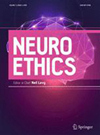
神經(jīng)倫理學(xué)是一個(gè)跨學(xué)科研究神經(jīng)倫理學(xué)和精神科學(xué)相關(guān)問(wèn)題的論壇。重點(diǎn)是通過(guò)神經(jīng)科學(xué)發(fā)展的新技術(shù)所帶來(lái)的倫理問(wèn)題,如精神藥物和其他干預(yù)精神的方法;神經(jīng)科學(xué)本身的實(shí)踐,包括在研究對(duì)象的成像工作中偶然發(fā)現(xiàn)的問(wèn)題;神經(jīng)科學(xué)技術(shù)的規(guī)管,以及心靈科學(xué)揭示了傳統(tǒng)的道德哲學(xué)問(wèn)題,如自由意志和道德責(zé)任的本質(zhì)、自我欺騙、意志的弱點(diǎn)和人格的本質(zhì)。這本重要的出版物涵蓋了神經(jīng)倫理學(xué)的兩個(gè)領(lǐng)域:神經(jīng)科學(xué)倫理學(xué)和神經(jīng)倫理學(xué)。它提供全面的參考書(shū)目、重要文獻(xiàn)的評(píng)論、包括部分會(huì)議記錄在內(nèi)的活動(dòng)信息,以及讀者評(píng)論意見(jiàn)部分。
Neuroethics is a forum for interdisciplinary studies in neuroethics and related issues in the sciences of the mind. The focus is on ethical issues posed by new technologies developed via neuroscience, such as psycho-pharmaceuticals and other ways of intervening in the mind; the practice of neuroscience itself, including problems posed by incidental findings in imaging work on research subjects; regulation of neuroscientific technologies, and ways in which the sciences of the mind illuminate traditional moral and philosophical problems, such as the nature of free will and moral responsibility, self-deception, weakness of the will and the nature of personhood.This important publication covers the dual areas of neuroethics: the ethics of neuroscience and the neuroscience of ethics. It offers comprehensive bibliographies, reviews of significant literature, information on activities including partial proceedings of selected meetings, and an opinions section for reader commentaries.
SCI熱門(mén)推薦期刊 >
SCI常見(jiàn)問(wèn)題 >
職稱論文常見(jiàn)問(wèn)題 >
EI常見(jiàn)問(wèn)題 >